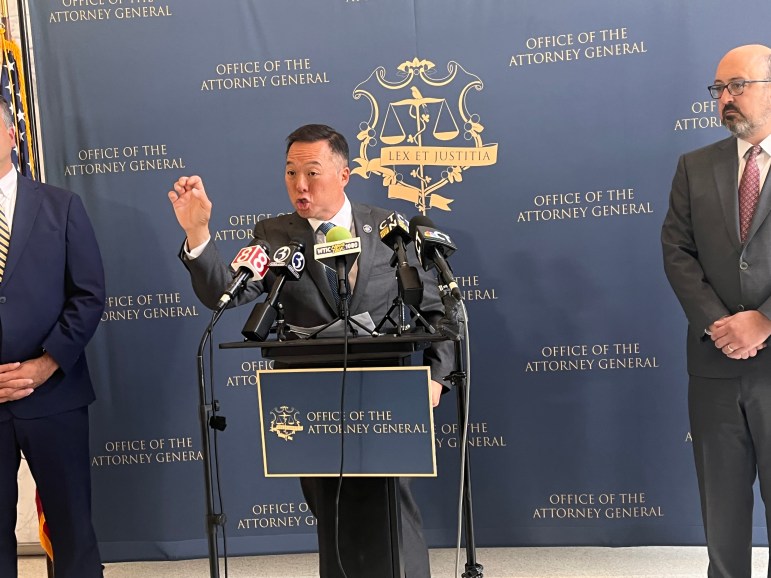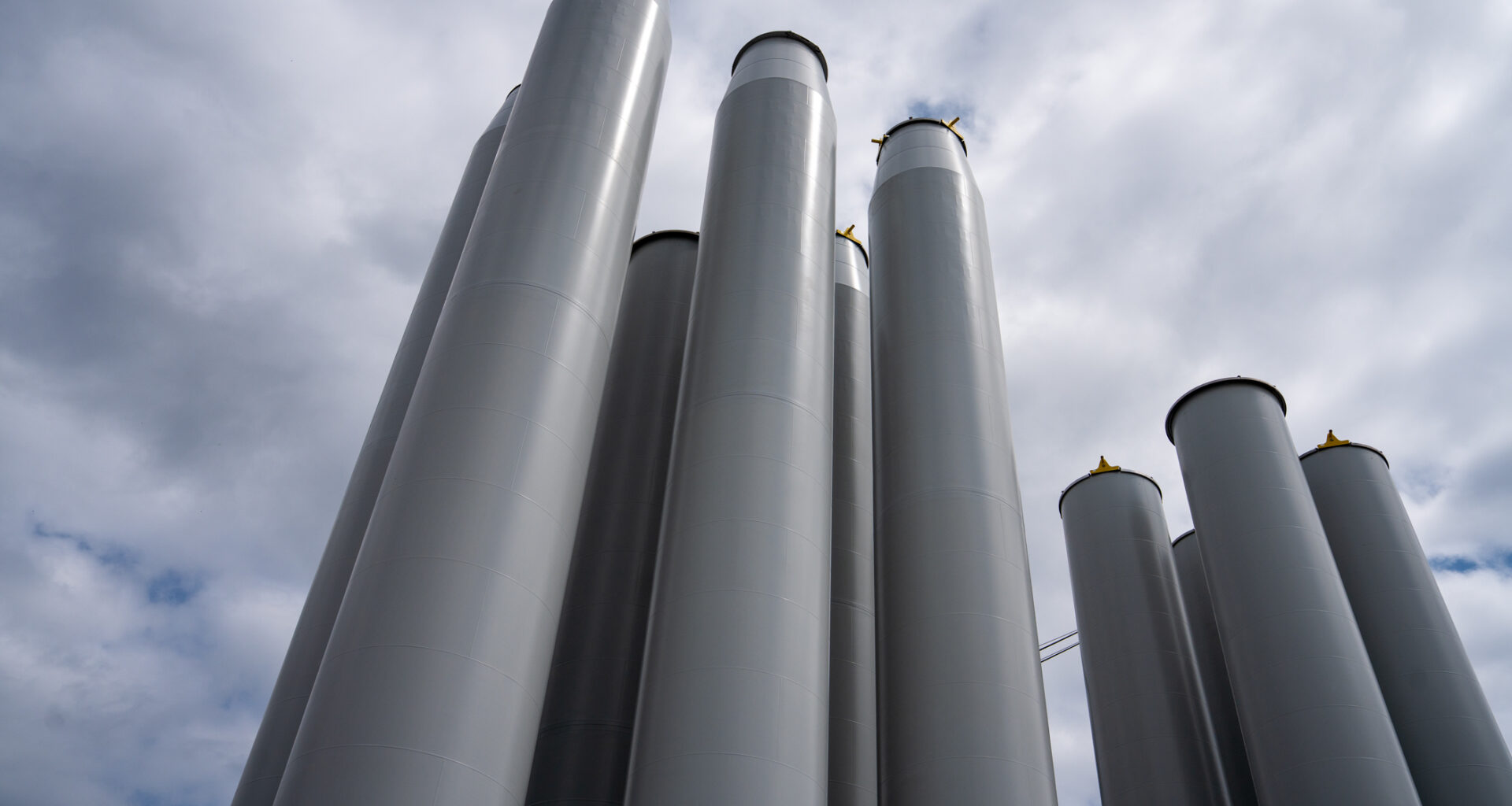A pair of lawsuits were announced Thursday seeking to block the Trump administration from halting work on the nearly-completed Revolution Wind project off the coast of Rhode Island.
The lawsuits — one filed by the project’s developers and the other by attorneys general for Rhode Island and Connecticut — came nearly two weeks after federal officials ordered an immediate shutdown of all offshore work on the 704 megawatt project.
At the time, Revolution Wind had already completed 80% of the work, including dozens of turbines mounted onto foundations set into the seafloor.
Gigantic sections of unfinished turbines were already on the ground at the State Pier in New London, where more than 100 workers are employed within the project’s staging area. Another 50 workers were told not show up for a two-week shift installing new turbines at sea, according to union officials.
“This is an utterly unlawful, baseless and frankly senseless and stupid stop-work order,” Connecticut Attorney General William Tong told reporters during a press conference at his office in Hartford.
“That’s why we’re in federal court today, along with our partners in Rhode Island, in federal court to stop Donald Trump and his all-out war on wind and wind power, and frankly, on ratepayers,” Tong continued.
Tong’s office said its lawsuit would be filed in the U.S. District Court of Rhode Island with his counterpart in that state, Democratic Attorney General Peter F. Neronha. As of late Thursday afternoon, a copy of the complaint was not yet available.
The other lawsuit was filed Thursday morning in federal court in Washington, D.C., by developers Ørsted and Skyborn Renewables.
Both lawsuits named the Interior Secretary Doug Burgum and the Bureau of Ocean Energy Management, which issued the stop-work order, as defendants. Tong said his lawsuit would also name President Donald J. Trump as a defendant.
“While Revolution Wind will continue to seek to work collaboratively with the Administration and other stakeholders toward a prompt resolution, it believes that BOEM lacked legal authority for the stop-work order and that the stop-work order’s stated basis violated applicable law,” Ørsted spokesman Karl-Erik Stromsta said in a statement. “The project is facing substantial harm from continuation of the stop-work order, and as a result, litigation is a necessary step.”
Officials with both the Department of the Interior and the BOEM declined to comment on the ligation Thursday.
White House spokesman Taylor Rogers defended the administration’s actions, saying in a statement that offshore wind projects had been given “unfair, preferential treatment,” under the previous administration of President Joe Biden.
“President Trump’s day one executive order instructed agencies to review leases and permitting practices for wind projects with consideration for our country’s growing demands for reliable energy, effects on energy costs for American families, the importance of marine life and fishing industry, and the impacts on ocean currents and wind patterns,” the statement said. “President Trump has ended Joe Biden’s war on American energy and unleashed America’s energy dominance to protect our economic and national security.”
 Attorney General William Tong called the Trump administration’s decision to halt work on Revolution Wind “utterly unlawful, baseless and frankly senseless and stupid,” before filing a lawsuit on Thursday. Credit: John Moritz / CT Mirror
Attorney General William Tong called the Trump administration’s decision to halt work on Revolution Wind “utterly unlawful, baseless and frankly senseless and stupid,” before filing a lawsuit on Thursday. Credit: John Moritz / CT MirrorWhile the decision to halt work on Revolution Wind was widely condemned by local officials, union leaders and environmental advocates, Gov. Ned Lamont had initially signaled hope last week that a deal could be worked out with the Trump administration to save the project.
Lamont pointed to an example earlier this year when federal officials halted work on another wind project under development in Brooklyn, N.Y., Empire Wind, only to reverse course after New York Gov. Kathy Hochul expressed a willingness to work with the administration to approve new gas pipelines.
Over the last two weeks, however, state officials say attempts to engage with their federal counterparts have gone nowhere. In a statement Thursday, Lamont said the Trump administration has yet to explain or justify its stop-work order.
“There is still a path forward if Washington is willing to be a partner,” Lamont said.
In its letter to Ørsted last month ordering the company to stop work, the BOEM cited unspecified concerns having to do with “national security interests” and “interference” with the use of various maritime areas as its reason for the decision.
Tong, however, called that explanation “garbage,” adding that any issues had already been resolved by BOEM and the Department of Defense.
“All of those questions were addressed in the permitting process,” Tong said. “That’s what the permitting process is for.”
The attorney general’s latest suit on Thursday was not the first to challenge the Trump administration’s actions toward offshore wind. In May, Tong joined with more than a dozen other Democratic attorneys general in a lawsuit seeking to block the administration’s decision to stop leasing new offshore areas for wind development.
That lawsuit remains pending. On Thursday afternoon, there was a hearing in the case in U.S. District Court in Massachusetts.
Attorneys in that case filed notices late last week to inform the court of the BOEM’s decision to halt work on Revolution Wind. The judge overseeing the case, William G. Young, said the decision to halt a fully-permitted project “creates a host of issues,” but he also said that action was somewhat different than the dispute before him, which deals mostly with the approval of future projects.
The Revolution Wind project was originally approved in 2023 as a partnership between Ørsted, a Danish energy company, and Eversource. The utility later sold its stake in the project to Skyborn Renewables, a division of Global Infrastructure Partners.
The initial $1.5 billion pricetag for the project has also risen substantially amid a wider trend of escalating costs within the offshore wind industry.
In their lawsuit Thursday, attorneys for the developers did not cite an exact figure but said the companies have already spent “billions of dollars” toward completing the project. Stromsta, the Ørsted spokesman, declined to say how much the stop-work order had cost the project.
